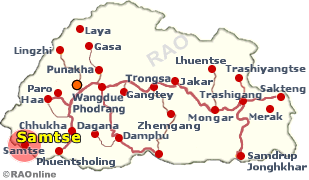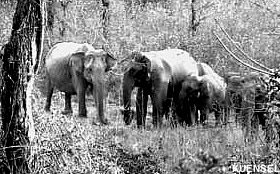| Bhutan's
Nature - Animals |
 |
Bhutan Nature Animals |
|
 |
Bhutan Information |
|
|
 |
| Wild elephants in Southern Bhutan |
| Chhukha and Samtse - Raiding elephants on the rampage |
 |
 |
|
On
14 June 2005, even as the 83rd session of the National Assembly discussed
preventive measures against the encroachment of wild elephants in the southern
dzongkhags of Samtse, Sarpang and Samdrup Jongkhar, several wild elephants
destroyed the home of Ram Bahadur of Peljorling under Sibsoo geog in Samtse.
|
|
For
more than a decade, the wild elephants have become an increasingly intolerable
nuisance for the farmers in the south.
A
herd of seven elephants completely wiped out about 300 kilogrammes of ginger,
100 kilogrammes of maize, and 100 jackfruits from farmer Sonka Uroan's
five-acre field. The herd also destroyed his home.
In
a continuing battle between the man and the animal, the farmers and the
local officials said that hundreds of elephants not only destroyed the
crops but also damaged houses and attacked people. "My house has already
been destroyed twice," said Deo Kumari Gurung of Peljorling, who recently
lost most of her four acres of maize crop to the elephants. "As soon as
the cultivation starts the elephants turn up and there is nothing much
we can do."
Raghu
Raj, who takes turns with his neighbours to keep guard at night, has given
up growing vegetables in his nine-acre field. Raghu Raj used to get about
80 sacks of rice from his field, but now even getting 20 is a good yield
for him. "We sow the crops but we do not reap," he said, adding that the
elephants attacked during the night and disappeared in the morning.
The
villagers tried to chase the elephants with sticks, stones and torches.
They also tried local repellants like burning dry chillies and hanging
poisonous bushes. Once they even brought donkeys to the village with the
belief that the donkeys' bray would scare the elephants away. "But all
was vain," said Deo Kumari Gurung. "The elephants got used to it all and
now they simply carry on with their munching spree."
|
Know
the elephants |
 |
 |
| Wild elephants have become a nuisance to farmers in South Bhutan |
|
The orld's
largest vegetarians, the elephants have the longest gestation period (of
about 22 months) among mammals.
It can grow up to 13 feet (four metres) tall and weigh as much as six tonnes. Despite its big size an
elephant can run 40 to 48 kilometres an hour.
|
|
An
adult elephant can eat about 180 kilogrammes of food a day while a herd can consume an entire field in one night. Fences and
other deterrents are often useless against hungry herds.
An
elephant family is led by a matriarch, with the matriarch being the oldest
and most experienced of the herd. The
matriarchal society consists of her female offsprings and their young.
When the matriarch dies, one of the oldest offsprings takes her place.
About
400 kilometres away, the villagers of Lhangchenphu geog in Samdrup Jongkhar are living with similar painful experiences. The villagers apparently spend
sleepless nights guarding their fields but the elephants attack the
field at dusk and munch on the crops all through the night. "They don't
leave until they wipe out the fields clean," said a farmer whose home was
partially destroyed by the wild animal. Numerous houses and crops have
been destroyed, leading to near-starvation for some households, the farmers
said.
With
no crop compensation from the government, the villagers chip in and help
those affected. "When we have no help from anywhere we have to come together
and help ourselves," said a disheartened farmer.
Farmers
in the Indian states used exploding "chilli bombs" as a stopgap measure.
The elephants with their very sensitive trunks dreaded the fiery smell
and it worked well as an effective measure.
The
farmers believe that poaching and destruction of elephant habitat across
the border force the animals to seek refuge in their land. The elephants
came in herds, sometimes in hundreds, the local officials said.
The
Samtse dzongda, Tashi Gyaltshen, said that even with an army of forest
officials, police and the villagers, it was difficult to ward off the animals.
"By the time these animals reach the Bhutanese border, they are already
agitated and they become more wild and dangerous," he said. Once a
farmer nearly lost his life while trying to chase the elephants away. In
Samtse alone, two people have lost their lives and many have been injured
in the process.
The
district forest officer of Samdrup Jongkhar, Kado Tshering, said that it
was difficult for seven officials deployed to guard 3,000 sq km of forests.
"We never know when and where the wild elephants would attack," he said,
adding that the single male elephant called the "rogue elephant" was even
more dangerous as it attacked people.
The
wild elephants, according to Kado Tshering, not only attacked people and
crops, but also attacked domestic animals like horses and cows. He said
that the wild elephants were violent even against their own breed, employed
for logging.
While
some geogs like Lhamoizhingkha, Umling and Chazigang geogs in Sarpang have benefited greatly with the introduction of electric fencing, the elephants
continued to cause havoc in Dargaythang, Yangchenphu, Dekiling, Chokorling,
Bur, and Singaye geogs.
The
Sarpang chimi, Thakur Homagai, said that he electrified the fencing around
his field from eight in the evening till four in the morning. "This has
helped me to keep the animals at bay," he said.
But
some doubt the technique. "Unless the wires are really big and strong,
I doubt they would keep the 6-tonne beast away for long," said an observer
working at an international agency.
The
officials of the Nature Conservation Division under the agriculture
ministry, said that a project to study the entire situation has been proposed,
and accordingly the government will come out with effective measures "against
the jumbo menace".
According
to the officials, an elephant census in the south would be conducted before
taking further action. "In the meanwhile, the villagers will have to work
hand in hand with the government officials to chase the wild beasts away,"
an official said.
The
officials believe that the elephants strayed into human settlements
mainly because human activities have shrunk animal migratory routes.
"Elephants attack only when their natural habitats are threatened," they
said. "But we cannot exactly identify how this has happened since we do
not have any background information."
A
national geographic news documentary noted that thousands of elephants
were killed each year for their ivory or meat, or because they had become
a danger to humans living around them.
The
World Wildlife Fund estimated that there were about 1.3 million African
elephants in 1970. By 1989 the number had slid to 600,000.
In
Sumatra islands in Indonesia, the Sumatran subspecies were rapidly disappearing
in large numbers because the forests were cut at a fast rate. With nowhere
to go, the elephants ended up causing crop damage, and then in turn, were
either poisoned or shot by the irate farmers.
By
religion, Bhutanese avoid harming elephants as they are considered sacred
animals. Officials said that some resettlers in the southern dzongkhags
from the east who revered the elephant as "meme Sangay or langphochey",
meaning Lord Buddha, believed that if one prayed and paid respect to the
animal, it turned and went away without harming either crops or people.
Elephants
are revered and worshipped in many religions. In Bhutan, the elephant is
considered as one of the seven precious possessions (Gyalse Naduen) or
Langpo Rinpoche. The precious elephant symbolises unlimited capability
and power of the Buddha.
International
elephant researcher, Joyce Poole, explains in her study of elephant behaviour
that like humans, elephants may also suffer from post-traumatic stress
disorder. "If a matriarch has a bad experience with people, her behaviour
will be adjusted accordingly - either more fearful or more aggressive depending
upon her own personality," she said.
"Other
members of the family will follow her lead during moments of crisis, and
younger elephants will learn how to act. Aggressive behaviour toward people
can be learned. Just as children learn prejudices from their parents, so,
too, do elephants," she added.
Meanwhile,
farmers like Raghu Raj Gurung do not know how to deal with the wild elephants.
They just scare them away to save their crops, but often it doesn't work.
"It is a frustrating dilemma," said Raghu Raj.
 |
| Contributed by Karma Choden, KUENSEL, Bhutan's national newspaper, 2005 |
top
| Wildlife and People in Bhutan |
 |
| Information on Bhutan |
 |
| Links |
 |
|




